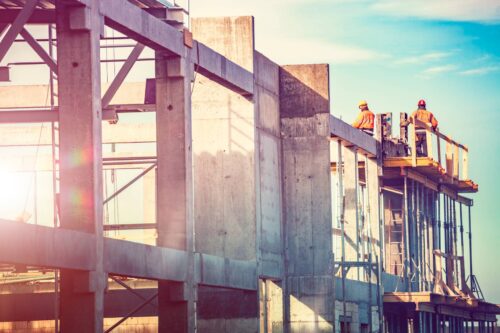
Policy Examples
Embodied Carbon Cities Policy Toolkit
This resource library was made in partnership with C40 Cities.

Policy Examples
Browse successful case studies and policy examples from the United States and across the globe. These resources are subdivided into policy types spanning voluntary programs to building code regulation.
City Embodied Carbon Reduction Targets:
San Francisco Hazards and Climate Resilience Plan:
San Francisco’s roadmap identifies climate hazards and risks and proposes strategies to reduce them and adapt to climate change impact.
Vancouver Embodied Carbon Reduction Target:
Aims to reduce embodied emissions in new buildings and construction projects by 40 percent by 2030.
Austin Climate Equity Plan:
Sets a target to reduce embodied carbon footprint of building materials used in local construction by 40 percent by 2030.
Building and Material Reuse
Milan’s Degraded-Abandoned-Disused Buildings Map:
Milan’s government aims to implement a land consumption map to identify degraded buildings and those that have been abandoned for at least a year and could threaten public health and safety.
Portland Deconstruction Requirements:
Portland’s ordinance requires single-dwelling structures built in 1940 or earlier seeking demolition permits to be fully deconstructed as opposed to mechanically demolished.
Vancouver’s Empty Homes Tax:
Vancouver implemented the Empty Homes Tax, also known as the Vacancy Tax, to help return empty and under-utilized properties to the market.
Bay Area Online Building Material Exchange:
Rheaply is an online exchange of building products including surplus and salvaged materials at cost-effective rates.
San Francisco Surplus Building Product Reduction and Redistribution Study:
The San Francisco Department of the Environment created this resource to provide a better understanding of situations that lead to surplus on construction sites.
Project C.O.R.E FAQ Page:
Baltimore passed a deconstruction policy called Project Creating Opportunities for Renewal and Enterprise (Project C.O.R.E) allowing thousands of vacant buildings to be deconstructed or demolished so that they can be used for redevelopment, reinvestment, and stabilization in Baltimore.
Building Materials Reuse Warehouse FAQ:
Houston's Building Materials Reuse Warehouse accepts donated construction materials from builders, supply companies, remodelers, contractors, and individuals. The donated materials can be used by any nonprofit organization.
San Antonio Deconstruction & Circular Economy Program:
The San Antonio Deconstruction & Circular Economy Program will recapture building materials from the waste stream and redirect them back to communities for reuse.
Whole-Building Embodied Carbon Reductions
Vancouver Embodied Carbon Requirements for Zoning Applications:
Vancouver requires certain developments to provide an embodied carbon design report showing the inputs and results of a whole-building life-cycle assessment (LCA).
Procurement
Dallas Sustainable Procurement:
Dallas Sustainable Procurement directives include a list of preferable products benchmarked to the EPA’s environmentally preferred product list.
Building Code
City of Toronto Green Standard V4 Embodied Carbon Limits for Low-Rise Homes:
Voluntary tier 2 (and higher) requirement for homes to be less than 250 kg CO2e/m2 according to analysis in the BEAM tool. This requirement will become mandatory in the next version of TGS.
Vancouver's Bylaws and Policy Updates:
The amendment introduces the first reduction requirements for embodied carbon in buildings as part of the city’s Embodied Carbon Action Plan and goal of reducing embodied carbon in new buildings and construction by 40 percent by 2030.
Denver Green Code:
Chapter 9 of the 2022 Denver Green Code contains embodied carbon requirements for ready-mix concrete and steel.
Zoning
Vancouver’s Green Buildings Policy For Rezoning: Process and Requirement:
This document outlines the submissions process related to Vancouver’s Green Buildings Policy for Rezoning. The policy offers two pathways to compliance: (a) near-zero emissions buildings and (b) low-emissions green buildings.
Permitting
Seattle’s Green Building Permit Incentives:
Seattle lists its green building permit incentives aimed at creating more efficient buildings that center around clean electric energy, water, and resource conservation with a focus on human health.
Construction Waste Recovery
San Francisco Construction and Demolition Factsheet:
San Francisco updated its Construction & Demolition (C&D) Debris Recovery Ordinance to include requirements for transporters and processing facilities of mixed C&D debris.
Boulder’s Commercial Construction Waste Recycling and Construction Waste Management:
Outlined in Chapter 36 – Commercial Construction Waste Recycling (starts on page 17, section 3601.1 through 3601.2.5 and Section R328) and Construction Waste Management (start on page 21, sections R328.1 through R328.2.5).
Boulder’s Residential Construction Waste Recycling:
An applicant for a building permit to construct a new dwelling unit must demonstrate all recyclable wood, metal, and cardboard materials were donated, reused, or recycled. (Chapter 5.5 – Residential Building Code).
San Francisco Demolition Requirements:
An overview of San Francisco Construction and Demolition Debris Recovery Law stating the construction and demolition (C&D) debris recovery requirements for C&D transporters, processing facilities, and projects.
Construction Site Emissions Reductions
London’s Low-Emissions Zone:
London has created a low-emissions zone for non-road mobile machinery (NRMM). NRMM includes mobile machines and transportable industrial equipment or vehicles and is not intended for transporting goods or passengers on roads.
European Commission Emissions Standards Proposal:
The EU parliament accepted the European Commission’s proposal for the non-road mobile machinery (NRMM) emissions standards. NRMM includes construction equipment, railroad engines, inland waterway vessels, and off-road recreational vehicles.
Please reach out to RMI and C40 Cities for other embodied carbon resources to support your city’s efforts to lead the reduction of embodied carbon in construction:
- Chris Magwood, cmagwood@rmi.org
- Cécile Faraud, cfaraud@c40.org
This resource library was inspired by a 2022 workshop series co-hosted by C40 and RMI for city officials seeking to implement embodied carbon reduction strategies. The resources included in the library were shared by the workshop attendee group and were developed the following organizations: American Institute of Architects, Architecture 2030, Architects Declare, Athena Sustainable Materials Institute, Buildings as Material Banks, Builders for Climate Action, Building Transparency, Carbon Leadership Forum, Carbon Neutral Cities Alliance, EHDD, Government Alliance on Race and Equity, Greenlining Institute, Mantle Developments, New Buildings Institute, OneClick LCA, Pacific Coast Collaborative, Sustainable Procurement Pledge, and the following municipalities: Austin, TX; Baltimore, MD; Boulder, CO; Dallas, TX; Denver, CO; Houston, TX; London, England; Milan, Italy; Phoenix, AZ; Portland, OR; San Francisco, CA; San Antonio, TX; Seattle, WA; Toronto, Canada; and Vancouver, Canada.